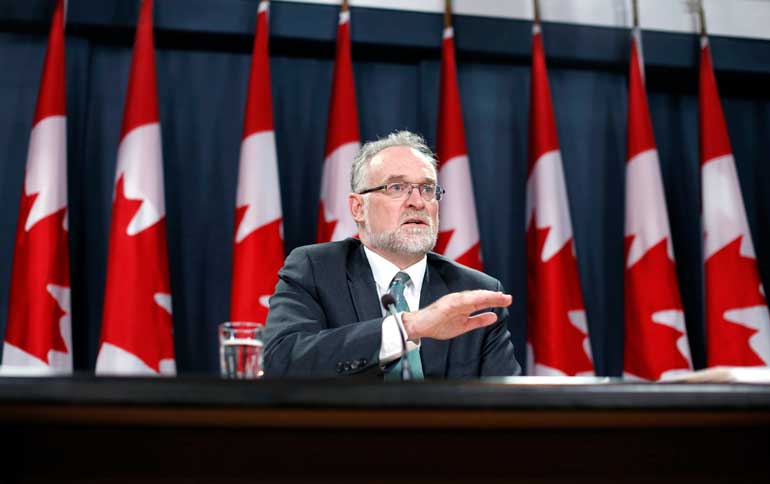By Travis Pereira
The Auditor General of Canada says Veteran Affairs Canada’s performance in providing wounded warriors mental health services is too slow.
Auditor General Michael Ferguson tabled his report in the House of Commons today and the report found the department isn’t providing services quickly.
“Veteran Affairs Canada is not adequately facilitating timely access to mental health services,” his report said.
The veterans’ report was part of an over-arching report by the Auditor General reviewing the federal government’s performance.
Although there was a key emphasis on Veteran Affairs Canada, this section of the report also touched on the transferring of military records between the Department of National Defence and the Canadian Forces.
Ferguson echoed a recommendation in the report that found there’s a need for steps to be taken to accelerate the transfer of these records in order to provide timely access to the appropriate mental health services.
It was established that Veteran Affairs has put in place certain integral support services, such as timely access to rehabilitation services, but they’re severely lacking in other areas.
“This finding is important because Veteran Affairs Canada has a legislative responsibility to facilitate access to the specialized care required by veterans with mental conditions.”
–Auditor General’s 2014 Fall Report
Ferguson said the operation of vital programs such as Disability Benefits requires more empathy for veterans.
Issues such as the complex and often confusing application process, coupled with slow processing times create unreasonable delays in receiving decisions for benefit eligibility.
This is important because this is the program through which most veterans access mental health services, and it needs to be analyzed from their perspective.
The report highlighted three main areas in need of improvement alongside comprehensive recommendations accompanying them:
- Eligibility decisions under the Disability Benefits Program are not timely
- There are longstanding barriers to timely access disability benefits
- Veteran Affairs Canada does not analyze appeal and review decisions to identify systemic problems in its application process
The report indicated that performance measures for Veteran Affairs Canada has a focus on quantity over quality.
It states “Veteran Affairs Canada needs to know if the support provided meets the mental-health needs of veterans.”
A focus on specifically tailored services to improve quality of life as opposed to the number of veterans served could help accomplish this goal.
There’s one clear feature of this often ambiguous and highly contentious debate surrounding government misuse of funding and provisioning of services.
Veterans and many who support them are furious with the current state of the treatment they receive.
@JulianFantino Disturbing treatment of our veterans!
— Scott Raible (@ScottRaible) November 25, 2014
@JulianFantino @HonRobNicholson would rather play cute with numbers, sue vets, hide info from those they use for photo ops #cdnpoli
— Polly Ticks (@PTicks) November 25, 2014
Criticism of the inability of Veteran Affairs Canada to fulfill its legislative responsibility wasn’t restricted to the Auditor General’s report.
Opposition parties certainly took advantage of the opportunity to comment on the lapses of the federal government in these crucial areas.
“The Auditor General was very clear that there’s no monitoring and no accountability of whether the money or the people are doing the job required of them to get the help ‘out the door’ to assist the men and women of our services,” said the Official Opposition Veteran Affairs critic, Peter Stoffer.
Stoffer said it shouldn’t have taken the report to serve as a ‘clarion call’ to the government that what’s being done to address the issue of veteran’s mental health isn’t working or being done properly.
“We’ve had more men and women die because of Afghanistan then actually die in Afghanistan and that’s due to suicide,” he said.
Stoffer said the report is a definite step in the right direction in developing an effective mental health strategy, but there needs to be more to ensure the protection of benefits for those veterans who come forward.
“The report is based off the 15, ooo people (veterans) who admitted they have mental health concerns, this is the amount the Auditor General knew about,” he said.
“But if you come forward and admit you have a problem the clock starts ticking on your possible removal from the military, so many suffer in silence. I suspect the figure could be much higher.”
The report comes on the heels of several spending initiatives announced recently by the Federal government including $200 million over six years to deal with mental health issues concerning veterans.
But many critics characterized the timing of funding commitments as an attempt to get ahead of the “politically toxic” report and stem criticism. It doesn’t offset the $1.1 billion earmarked for veterans but was unused and returned to the treasury, critics claim.
“I live just 15 minutes away from where the announcement was made and they never advised me,” said Stoffer.
“You could tell they got a head’s up about the report, which they always do. It’s rather unfortunate they just couldn’t have been forthright about their intentions.”
Stoffer said the Official Opposition has written a letter to the federal government stating they would like detailed quarterly reports tracking the progress of the newly pledged funding commitments to be sent to the House of Commons.
“At the end of the day, no matter what I say or what Fantino says, if the money and the help is there then that’s a good thing for our veterans,” he said.
“They (Veterans) don’t care about the politics they’re just asking for basic health and dignity.”
In the wake of the stern message within the report, it remains to be seen if the new funding commitments by the federal government will effectively eliminate the barriers preventing veterans from getting timely access to the mental health services and benefits they need.

